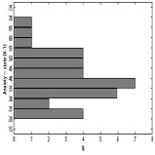Anxiety and Working Memory in Asthma
Monika Talarowska, Maciej Kuśmierek, Tadeusz Pietras, Kinga Bobińska, Katarzyna Wachowska, Paweł Górski
Med Sci Tech 2014; 55:16-20
DOI: 10.12659/MST.890112
Available online: 2014-02-25
Published: 2014-02-25

Background:
In everyday experiences, separating emotions from cognition seems to be impossible. Most emotional experiences entail cognitive processes and its indispensable element becomes our emotions. It is also very well known that symptoms of anxiety are strictly controlled with the degree of severity of asthma. The aim of this study was to evaluate the relation between the severity of anxiety and the efficiency of working memory in asthma patients.
Material and Methods:
We enrolled 40 patients with asthma (ages 23–63 years). Assessment of cognitive function was based on performance on the Trail Making Test (TMT) and the Stroop Test. To evaluate the level of anxiety, the State-Trait Anxiety Inventory (STAI) of Spielberger was used.
Results:
Statistically significant correlations between intensity of anxiety-state and anxiety-trait on the day of the examination and efficiency of visual-spatial and verbal-auditory working memory were observed. Duration of disease had no influence on the level of task performance.
Conclusions:
1) Higher level of anxiety as a state and anxiety as a trait negatively influenced effectiveness of visual-spatial and auditory-verbal working memory in patients with asthma. This was not related to the duration of the disease. 2) Mutual correlations between emotional processes and working-memory in the course of asthma need to be examined further.
Keywords: , working memory, Anxiety, Asthma



